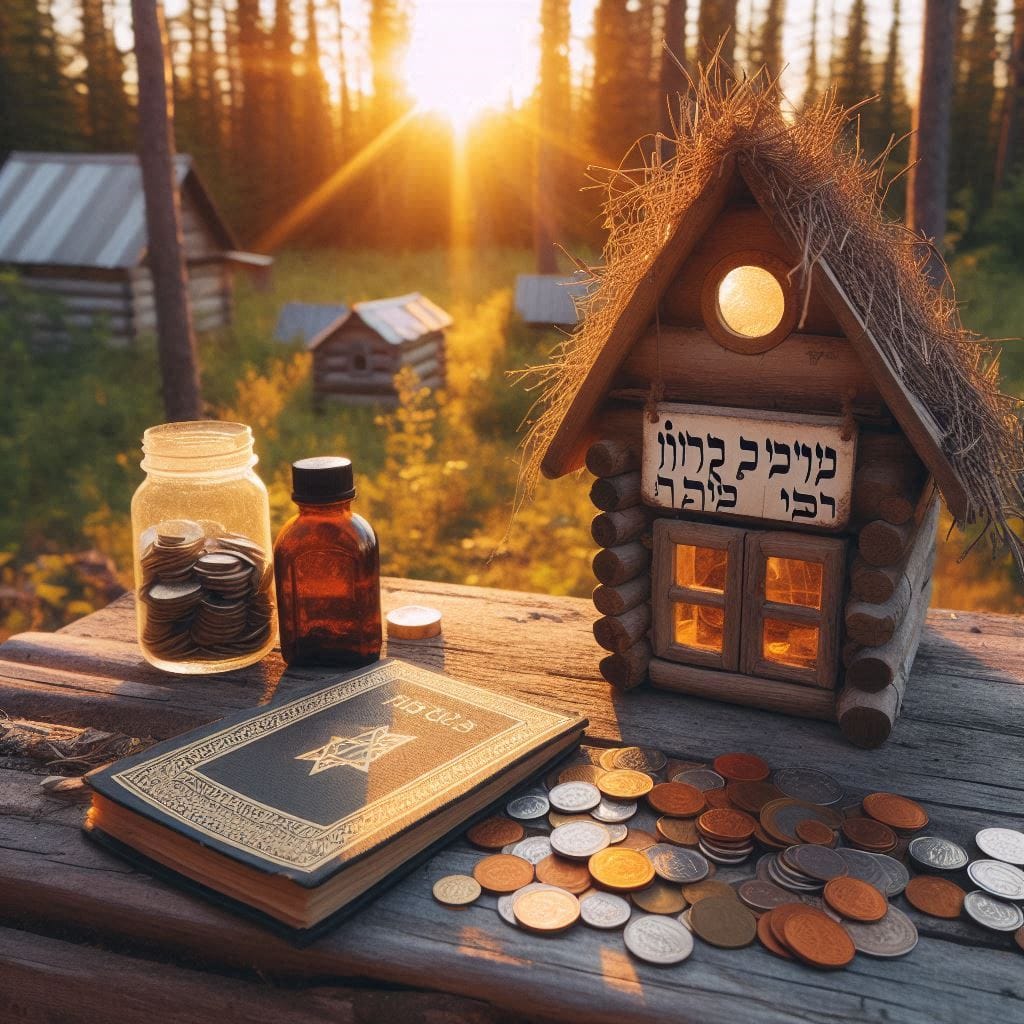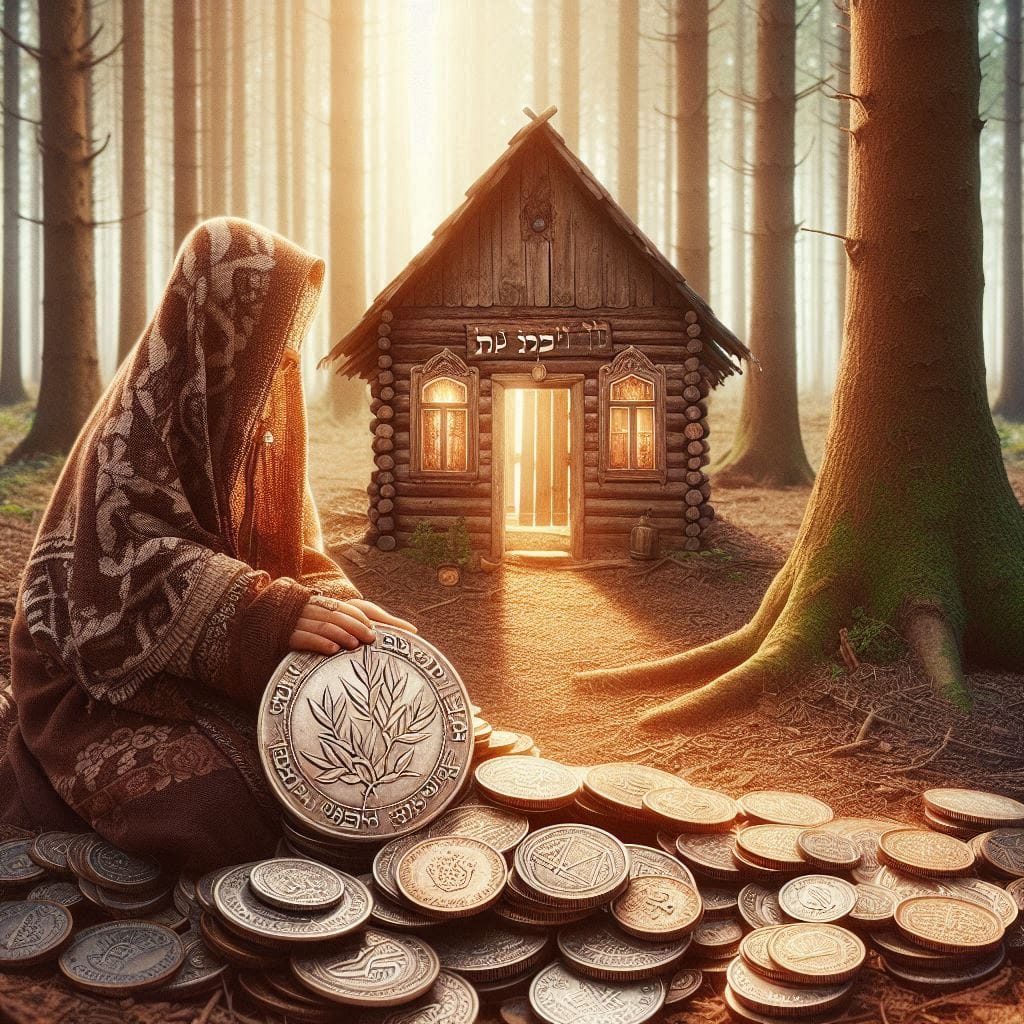
The Open Hand and the Hidden Door
B"H
I. The Whisper Behind the Coin
“You shall surely open your hand to your brother, to your poor and to your needy in your land.”
— Devarim 15:11
Tzedakah is not an act of generosity — it is an act of justice. In Hebrew, the word tzedakah comes from tzedek, righteousness. It’s not charity; it’s not optional. It’s covenantal. The Torah doesn’t suggest that we be kind to the poor. It demands that we open our hands — not reluctantly, not conditionally, but with readiness and humility.
Yet something else happens when we give. Beyond the help it provides, beyond the moral discipline it instills, something quiet takes place: heaven listens. The act of giving touches not just the poor — it touches God. And every coin that leaves your hand becomes a whisper at the gates of mercy.

II. The Tithe as a Tuning Fork for the Soul
“Tithe, so that you may learn to fear HaShem your God all your days.”
— Devarim 14:22–23
Tithing isn’t only for sustenance. It’s for reverence.
Rambam writes that tithing functions as a training ground for the soul. (Mishneh Torah, Hilchot Matanot Aniyim 7). When you separate a tenth, it breaks the illusion that your money is your own. It reorients you: you are a steward, not a sovereign.
The Torah describes a spiritual feedback loop: the act of giving softens the heart and sharpens the conscience. It brings one to yirat Hashem — not fear as terror, but awe, humility, awareness. You begin to understand that everything you receive is also a kind of tithe from Heaven — and your tithe becomes your return.

III. The Mystery in a Single Coin
Rebbe Nachman teaches in Likutei Moharan that giving tzedakah sweetens harsh judgments.
The Zohar says it similarly: when a person opens their hand below, HaShem opens His hand above (Zohar). A coin given in secret may become light in the highest heavens.
But how?
Each act of giving is a spiritual transformation — it changes you, but also shifts reality. The poor man receives bread. The giver receives refinement. And the universe receives harmony.
Even more: the act itself draws compassion down. It becomes a rectification in the upper worlds (tikun olamot), echoing with the signature of kindness.

IV. Four Levels of Giving (and Receiving)
Rambam’s famous eight levels of tzedakah (Mishneh Torah, Hilchot Matanot Aniyim 10) guide the soul upward, but they can be distilled into four deep archetypes:
1. The Eye Level – Giving while looking the person in the eye, acknowledging their dignity. You see them.
2. The Silent Level – Anonymous giving. You preserve their honor and protect your ego.
3. The Seed Level – Helping someone gain independence, preventing poverty before it starts. The highest form of empowerment.
4. The Selfless Level – Giving before being asked, without waiting to be needed. Anticipating the cry before it rises.
But there is a fifth, hidden level:
5. The Receiving Level – To accept help in humility. The Sages say: “More than the wealthy give to the poor, the poor give to the wealthy.” (Vayikra Rabbah)
Because to receive without resentment or shame is itself a great spiritual refinement.

V. The Broken Gate Opens from Within
“Fortunate is he who considers the poor; HaShem will deliver him in times of trouble.”
— Tehillim 41:2
The word for poor in Hebrew is dal, but dal also means “door” (as in delet). When you give to the dal, you’re not just helping a person — you’re unlocking a door in the universe.
Rebbe Nachman explains that there are gates which can only be opened from the inside — by humility, brokenness, or compassion. When you reach through to someone in their lack, you reach into your own. You become a vessel that God can fill.

VI. A Tzedakah of Firewood and Friendship
Not all tzedakah comes in silver coins.
• Giving someone firewood in winter — tzedakah.
• Giving up your seat for someone older — tzedakah.
• Bringing food to a sick neighbor — tzedakah.
• Smiling at someone who feels invisible — tzedakah.
• Teaching Torah to someone who forgot how to hope — tzedakah.
Tzedakah is not just money. It is time, effort, attention, kindness, presence.
Don’t wait for a fancy envelope. Look at the person next to you. Someone is starving — not for bread, but for blessing.

VII. The Left Hand and the Eternal Bank
Rebbe Nachman once said: “Give with your left hand — your weaker hand — so your right hand is always ready to give again.” (Likutei Moharan)
What did he mean?
Give gently, give humbly. Let the act of giving not deplete you, but define you. Rambam writes in Hilchot Matanot Aniyim 10 that tzedakah is greater than all other mitzvot — because it is the sign of the righteous and the foundation of redemption.
There is an eternal bank in Heaven. Not for wealth. But for worth. Every time you give with a pure heart, you deposit something timeless.

VIII. Malachi’s Window — and the Twisting of Heaven’s Treasury
“Bring the full tithe to the storehouse, that there may be food in My House; and test Me now in this, says HaShem of Hosts, if I will not open the windows of Heaven and pour down for you blessing without end.”
— Malachi 3:10
This is perhaps the most famous verse on tithing — and one of the most misused.
1. What Malachi Really Said
Malachi was rebuking Israel for spiritual laziness and corrupt offerings. The people were withholding tithes and defiling the Temple, offering blind and lame animals, and turning their backs on God’s covenant.
His call was simple: return to the covenant. Bring your full tithe — meaning your full faith, your full obedience, your full heart — and HaShem will reopen the heavenly gates.
It was about national repentance, not personal enrichment.
2. What the Prosperity Gospel Preaches
In some modern churches, Malachi is twisted into a divine investment pitch:
“Give your tithe, and God will give you tenfold!”
“Plant your seed, and reap your harvest!”
“If you give to this ministry, you’re opening your blessing portal!”
This theology is spiritual consumerism. It gives rise to a transactional relationship with God, reducing mitzvot to mechanisms of wealth.
But tzedakah is not a lottery ticket. The Torah demands we give, not to receive — but because it's right. If blessing comes, it comes by grace, not by contract.
3. The Jewish Way: Give and Trust
Chazal say that only in tzedakah is one allowed to “test” HaShem. But even then, not with arrogance.
Rambam warns us not to give in order to become rich. He writes that the highest level is to give because you know it’s good, not because it will pay off.
You can give and say: “HaShem, I trust You see this. I trust You know what I need. I give not to open Your hand — but to open mine.”

IX. A Final Word: Your Hand Is a Gate
Your hand is a gate.
When you close it, nothing gets in. When you open it — to give, to help, to bless — something miraculous happens: Heaven opens too.
The poor man may not even know your name. But the angels do.
The dollar may vanish from your wallet. But the kindness never vanishes from the world.
Give. Because HaShem gave you life. Give. Because someone gave you hope once. Give. Because one day, you may be on the receiving end.
And when that day comes — may someone else remember this teaching.

X. A Final Parable: The Ember and the Treasury
There was once a simple woman who lived on the edge of a frozen village. She had no silver, no inheritance, and no oil left in her lamp. But each week, before Shabbat, she took one coin — her last — and placed it beneath the broken stone near the synagogue door.
No one saw. No one asked. She never told. She simply gave.
One day, the village was struck with a bitter famine. Even the wealthiest families had empty cupboards, and the treasury of the town was bare. The leaders gathered in fear, wondering why their prayers and donations hadn’t stopped the suffering.
Then a traveling tzaddik came to town. He walked through the streets and paused near the broken stone by the synagogue.
He wept.
“What do you see?” they asked him.
And he replied, “I see light. A flame that has risen straight through the heavens. Someone has opened the gates with a whisper.”
They searched and found the old woman, nearly forgotten by all. When asked why she gave when she had nothing, she replied:
“Because even one ember can light a forest if you give it with love.”
The famine lifted soon after.

Reflections
The greatness of tzedakah is not measured by the number in the bank account, but by the courage to part with something precious.
Some give from abundance and feel no loss. Others give from emptiness and create eternity.
It is not the coin that opens heaven, but the surrender behind it.

Subscribe now.
Sign up for our newsletter to get the most interesting stories of the day straight to your inbox before everyone else
Created with © systeme.io • Privacy policy • Terms of service


